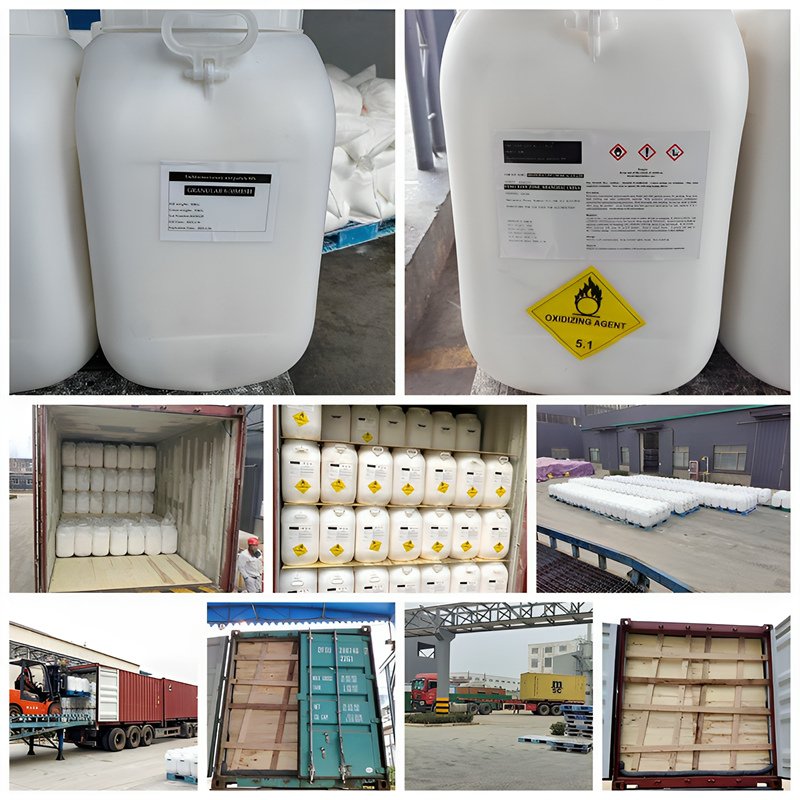Trichloroisocyanuric Acid
Trichloroisocyanuric acid, also known as TCCA, is a disinfectant and fungicide widely used in swimming pools, drinking water, wastewater treatment, etc.
| Effective chlorine content | ≥ 90% |
|---|---|
| Appearance | white crystalline powder, granules, and various tablets, with hypochlorous acid odor |
| Solubility | Soluble in water, releases chlorine when dissolved |
| Stability | Stable under dry conditions, but easily affected by moisture, light and high temperature |
| Packaging | 25kg/ finished bag, 25kg/ plastic bucket, 50kg/ plastic drum(customized) |
Product Details
Trichloroisocyanuric acid (TCCA) plays a vital role in disinfection and water treatment applications. It provides a stable release of chlorine, effectively eliminating bacteria, viruses, and algae from the water. Additionally, it is highly effective in removing bacteria, mold, and pathogenic microorganisms in environments such as bathrooms and kitchens. Our TCCA is produced in full compliance with internationally recognized quality control standards, ensuring consistent performance and reliability. It adheres to stringent environmental safety regulations, meeting all necessary criteria for safe handling, storage, and use. We implement rigorous testing procedures at every stage of production to guarantee that our products meet the highest safety and efficacy standards. Additionally, our manufacturing processes are regularly audited to ensure continued compliance with global regulatory frameworks, including ISO certifications and environmental protection guidelines.
Our TCCA is produced in full compliance with internationally recognized quality control standards, ensuring consistent performance and reliability. It adheres to stringent environmental safety regulations, meeting all necessary criteria for safe handling, storage, and use. We implement rigorous testing procedures at every stage of production to guarantee that our products meet the highest safety and efficacy standards. Additionally, our manufacturing processes are regularly audited to ensure continued compliance with global regulatory frameworks, including ISO certifications and environmental protection guidelines.
Customized Specifications
We provide a variety of particle shapes and sizes of trichloroisocyanuric acid according to customer requirements to better exert the performance of the products and ensure their best effect in different applications. There are various ranges from 8 to 30 mesh for customers to choose.Product Applications
Water treatment: used for disinfection and sterilization of swimming pools, drinking water, wastewater, industrial circulating water, etc. Agriculture: used for plant protection, sterilization, and disinfection in agricultural planting. Bleaching: can be used for bleaching textiles, pulp, wood, etc. More: used in various disinfection and sterilization fields, such as hospitals, public health, families, etc.Product Advantages
High-efficiency sterilization: can quickly kill various bacteria, viruses, and algae, and keep the water clean. Easy to use: can be directly added to water to release effective chlorine, easy to operate. Widely applicable: suitable for swimming pool water treatment, drinking water disinfection wastewater treatment, and other fields. Long-lasting: has a long-term sterilization effect and is not easy to decompose.Usage Method
Dosage: adjust the dosage according to different application scenarios (for example, the common dosage for swimming pool water disinfection is 30-50 grams per ton of water). Operation Guide: It should be used according to the product instructions, avoid direct contact with skin and eyes, and wear appropriate protective equipment when using.Storage Conditions:
Store in a dry, cool, well-ventilated place, and avoid contact with flammable substances.
Safety Protection:
Avoid inhalation of dust and gas and contact with skin and eyes. If accidentally contacted, rinse immediately with plenty of water.
Environmental Protection Requirements:
After use, wastewater should be properly handled to avoid environmental pollution.
Packaging
Typically, we offer 50kg barrel packaging for the safety and convenience of storage and transportation. But we also provide custom packaging solutions based on the customers’ specific requirements.
The barrels we use to store the chemicals are made of high-density polyethylene (HDPE) plastic. These barrels are highly resistant to chemical corrosion and can resist the corrosion of acids, alkalis, salts, and most chemicals. The barrel wall thickness is approximately 2-5mm, and the barrel cover uses a sealing cover to prevent chemical leakage.
The labeling requirements for the barrel outer packaging completely follow GHS requirements, clearly identifying the hazards of chemicals, including label colors and symbols (such as corrosive, flammable, environmental hazard symbols, etc.). Necessary safety measures are also provided, such as treatment methods and first aid measures after contact with chemicals.
When packing, our factory operators will use forklifts to move the neatly stacked barrels of chemicals into the carriage. Each box of goods has a fixed weight limit to ensure that it is not overloaded. In addition, each layer is equipped with partitions to reduce friction between barrels.
Transportation
Typically, we use the sea transportation. But all the packaging materials are moisture-proof, waterproof, and corrosion-resistant, which can ensure the stability of chemicals and prevent leakage or reaction.
All packages are clearly noted with dangerous goods identification and safety data to meet international transportation regulations during transportation, storage, and operation, and to ensure personnel safety and environmental protection during transportation.
Meanwhile, sea transportation can accommodate a large amount of goods, especially for chemicals that are heavy and large in volume, and th etransportation cost per unit of goods is lower.
In addition, sea transportation has a wide transport network, and almost all ports can be used for sea transportation. Its transportation cycle is also relatively stable and highly secure.






